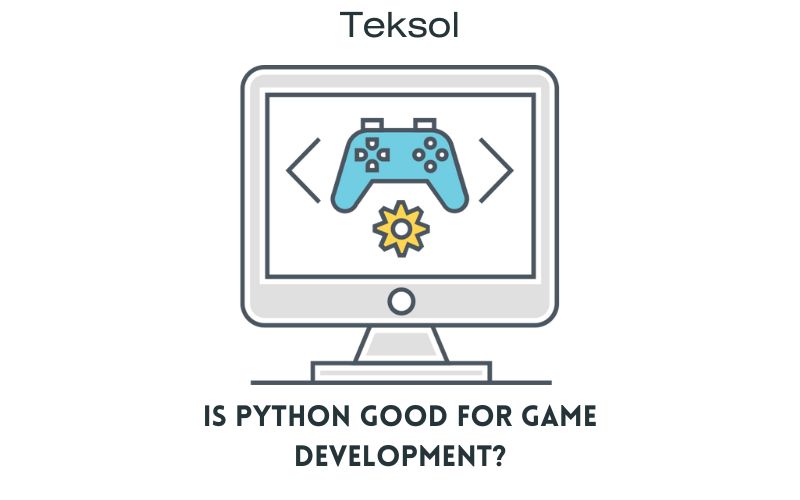Python is a versatile and widely used programming language that is popular among developers. It is widely used for web development, data science, machine learning, and many other applications. But what about game development? Is Python good for game development?
The answer is not so simple. Python has many advantages and disadvantages when it comes to game development. In this article, we will explore some of the pros and cons of using Python for game development, and some examples of games that are made with Python.
Pros of Using Python for Game Development
#1- Python is easy to learn and use
Python has a simple and elegant syntax, which makes it easy to read and write code. It also has a large and active community, which provides many resources and tutorials for beginners and experts alike. Python is a high-level language, which means it abstracts away many of the low-level details of the computer, such as memory management and pointers. This allows developers to focus on the logic and design of the game, rather than the technical details.
#2- Python is cross-platform and portable
Python can run on almost any platform, such as Windows, Linux, Mac, Android, iOS, and even web browsers. This means that developers can create games that can be played on multiple devices and platforms, without having to rewrite the code for each one. Python also has many libraries and frameworks that can help with game development, such as Pygame, Pyglet, Panda3D, Kivy, and PyOpenGL. These libraries and frameworks provide tools and features for graphics, sound, input, physics, networking, and more.
#3- Python is flexible and expressive
Python supports multiple programming paradigms, such as object-oriented, functional, procedural, and imperative. This gives developers the freedom and flexibility to choose the best approach for their game. Python also has many features that make it expressive and powerful, such as dynamic typing, duck typing, multiple inheritance, generators, decorators, and list comprehensions. These features allow developers to write concise and elegant code, and to implement complex functionality with ease.
Cons of Using Python for Game Development
#1- Python is slow
Python is an interpreted language, which means that it executes the code line by line, rather than converting it into machine code beforehand. This makes Python slower than compiled languages, such as C or C++. Python also has a feature called the Global Interpreter Lock (GIL), which limits the concurrency of Python applications by preventing multiple threads from executing Python code simultaneously. This limits the performance and scalability of Python applications, especially for games that require high-speed and real-time processing.
#2- Python is not widely used for game development!
Python is not a mainstream choice for game development, compared to other languages, such as C#, C++, or Java. This means that there are fewer tools, libraries, frameworks, and engines that support Python for game development. For example, some of the most popular game engines, such as Unity, Unreal, and Godot, do not have native support for Python. This means that developers have to use third-party plugins or wrappers, which may not be stable or compatible. Python also has less support and documentation for game development, compared to other languages.
#3- Python is not suitable for low-level and complex games!
Python is a high-level language, which means it hides many of the low-level details of the computer, such as memory management and pointers. This makes Python easier to use, but also less efficient and precise. Python also has a garbage collector, which automatically frees up the memory that is no longer used by the program. This can cause unpredictable pauses and delays in the game, which can affect the user experience. Python also has limitations in terms of performance and scalability, which makes it unsuitable for games that require intensive graphics, physics, sound, or networking.
Read More From The Teksol: Talent Development Build Dream Team
Examples of Games Made with Python
Despite the drawbacks, Python is still a viable option for game development, especially for indie developers and hobbyists. Python can be used to create simple and fun games, or to prototype and test ideas quickly. It can also be used to create games that are more focused on the story, art, or gameplay, rather than the graphics or performance.
Here are some examples of games that are made with Python:
Minecraft

Minecraft is one of the most popular and influential games of all time. It is a sandbox game that allows players to create and explore a procedurally generated world of blocks. Minecraft was originally written in Java, but it also has a version called Minecraft: Pi Edition, which is written in Python and runs on the Raspberry Pi. This version allows players to interact with the game world using Python code, and to create their own mods and scripts.
Civilization IV

Civilization IV is a turn-based strategy game that lets players control a civilization from the ancient to the modern era. It was written in C++, but it also has a Python layer that exposes the game engine and allows modders to customize and extend the game. Many of the game features, such as the user interface, the artificial intelligence, and the scenarios, are written in Python.
Eve Online

Eve Online is a massively multiplayer online role-playing game that takes place in a sci-fi universe. It was written in Stackless Python, which is a variant of Python that supports concurrency and distributed computing. This game uses Python for the game logic, the user interface, the database, and the networking. Eve Online is one of the most complex and ambitious games ever made, and it showcases the power and scalability of Python.



